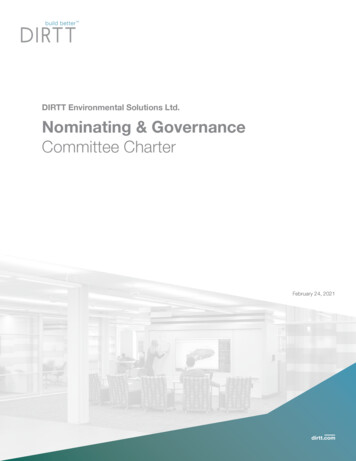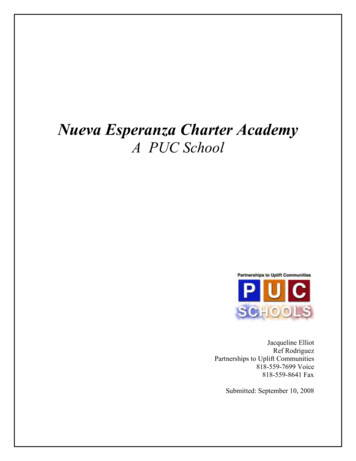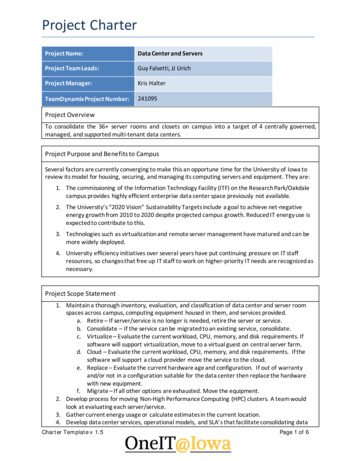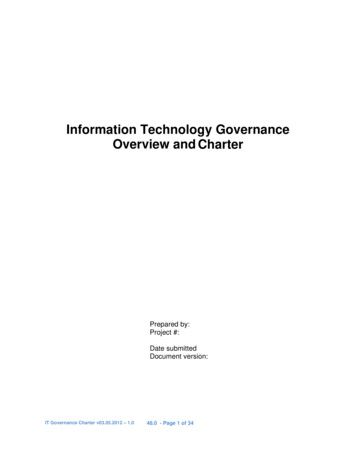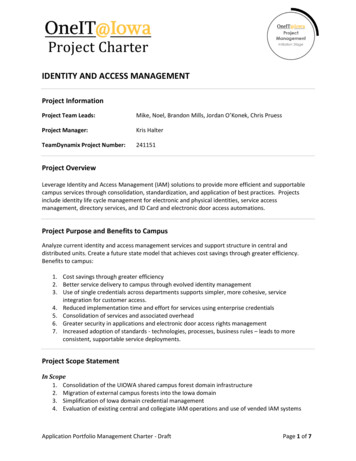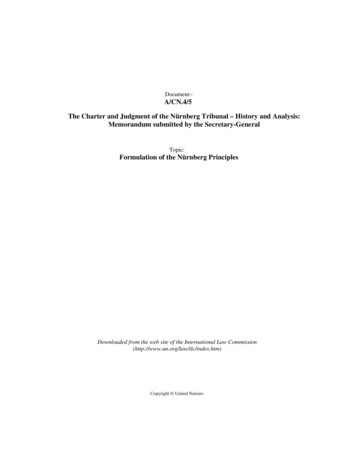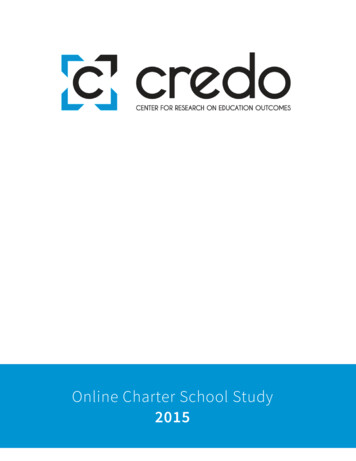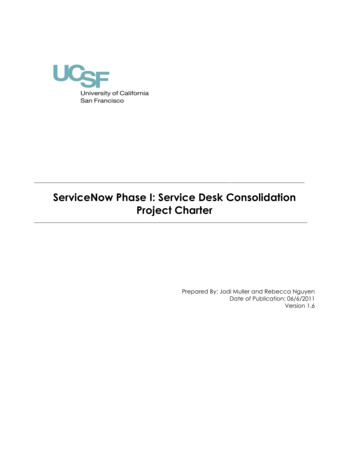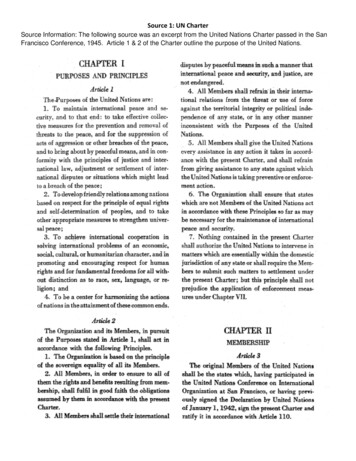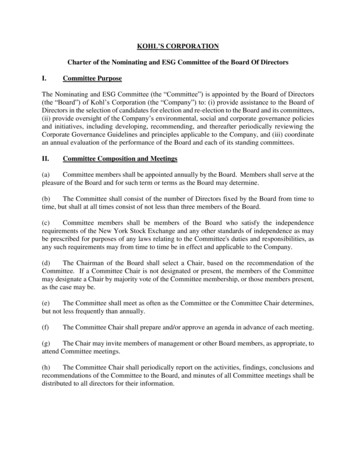
Transcription
KOHL’S CORPORATIONCharter of the Nominating and ESG Committee of the Board Of DirectorsI.Committee PurposeThe Nominating and ESG Committee (the “Committee”) is appointed by the Board of Directors(the “Board”) of Kohl’s Corporation (the “Company”) to: (i) provide assistance to the Board ofDirectors in the selection of candidates for election and re-election to the Board and its committees,(ii) provide oversight of the Company’s environmental, social and corporate governance policiesand initiatives, including developing, recommending, and thereafter periodically reviewing theCorporate Governance Guidelines and principles applicable to the Company, and (iii) coordinatean annual evaluation of the performance of the Board and each of its standing committees.II.Committee Composition and Meetings(a)Committee members shall be appointed annually by the Board. Members shall serve at thepleasure of the Board and for such term or terms as the Board may determine.(b)The Committee shall consist of the number of Directors fixed by the Board from time totime, but shall at all times consist of not less than three members of the Board.(c)Committee members shall be members of the Board who satisfy the independencerequirements of the New York Stock Exchange and any other standards of independence as maybe prescribed for purposes of any laws relating to the Committee's duties and responsibilities, asany such requirements may from time to time be in effect and applicable to the Company.(d)The Chairman of the Board shall select a Chair, based on the recommendation of theCommittee. If a Committee Chair is not designated or present, the members of the Committeemay designate a Chair by majority vote of the Committee membership, or those members present,as the case may be.(e)The Committee shall meet as often as the Committee or the Committee Chair determines,but not less frequently than annually.(f)The Committee Chair shall prepare and/or approve an agenda in advance of each meeting.(g)The Chair may invite members of management or other Board members, as appropriate, toattend Committee meetings.(h)The Committee Chair shall periodically report on the activities, findings, conclusions andrecommendations of the Committee to the Board, and minutes of all Committee meetings shall bedistributed to all directors for their information.
III.AuthorityThe Committee may delegate to its Chair such power and authority as the Committee deems to beappropriate, except such powers and authorities required by law to be exercised by the wholeCommittee or by a subcommittee, which the Committee has the authority to form and delegate to,consisting of one or more Committee members, when appropriate.In the course of fulfilling its duties, the Committee shall have the authority to retain and terminateany search firm or its own independent legal, accounting or other advisors in its sole discretion,including sole authority to approve the fees and other retention terms of any such consultant oradvisor.IV.Responsibilities And Duties(a)Directorship ManagementIn carrying out its responsibilities with respect to directorship management, the Committee shall:(1)Identify potential candidates for nomination as Directors on an ongoing basis, in suchmanner as the Committee deems appropriate. Director candidates shall be selected on the basis ofthe contributions they can make in providing advice and guidance to the Board and management.Selection should be made from individuals whose leadership, effectiveness and socialresponsibility have been demonstrated or whose specialized training and experience is of value tothe Company. The Board is committed to an inclusive Board with a diversity of experience andoutlook;(2)Identify Board members qualified to fill vacancies on any committee of the Board and torecommend that the Board appoint the identified member or members to the respective committee.In nominating a candidate for committee membership, the Committee shall take into considerationthe factors set forth in the charter of the committee, if any, as well as any other factors it deemsappropriate, including without limitation the consistency of the candidate’s experience with thegoals of the committee and the interplay of the candidate’s experience with the experience of othercommittee members; and(3) Review the qualifications and independence of the members of the Board and its variouscommittees on a regular periodic basis and make any recommendations the Committee membersmay deem appropriate from time to time concerning any recommended changes in the compositionand size of the Board and its committees.(b)Environmental, Social and Corporate GovernanceIn carrying out its responsibilities with respect to environmental, social and corporate governancematters and practices, the Committee shall:(1) Oversee the Company’s corporate governance initiatives and periodically consider, andreport to the Board on, corporate governance policies. In connection with this responsibility, the
Committee shall initially establish and then periodically review and assess the adequacy of theCorporate Governance Guidelines of the Company and recommend any proposed changes to theBoard for approval;(2) Review and assess the Company’s compliance with the rules of the NYSE and any otherlegal or regulatory requirements pertaining to corporate governance as may be in effect andapplicable to the Company from time to time;(3) Recommend to the Board such changes to the Board's committee structure and committeefunctions as the Committee deems advisable;(4) Recommend to the Board such additional actions related to corporate governance matters,as the Committee may deem necessary or advisable from time to time;(5)Review shareholder proposals and proposed responses;(6)Oversee the Company’s director orientation and continuing education programs;(7) Review and approve or ratify transactions with the Company involving members of theBoard or officers of the Company who are subject to Section 16 of the Securities Exchange Act of1934, as amended, provided however that the Committee need not review transactions orarrangements subject to review by the Compensation Committee. The Company’s Related PartyTransactions Policy is attached to this charter as Attachment 1;(8) Oversee and monitor, and periodically report to the Board on, the Company’s policies,initiatives and disclosures relating to environmental and social matters as they pertain to theCompany’s business and long-term strategy, including human rights and ethical business practices,environmental and sustainability initiatives, diversity and inclusion and other initiatives related tothe Company’s operations and engagement with associates, customers, suppliers, andcommunities, other than with respect to human capital management matters overseen by theCompensation Committee and compliance and controls matters overseen by the Audit Committee;and(9)V.Monitor Company associates’ compliance with “Kohl’s Code of Ethics” and related policiesEvaluation(1)The Committee will review and reassess the adequacy of this Charter annually andrecommend any proposed changes to the Board for approval; and(2)The Committee will coordinate an annual evaluation of the performance of the Board ofDirectors and each of its standing committees. The Committee will receive comments from allDirectors and report annually to the Board with an assessment of the Board and its committeesLast Revised: February 24, 2021
Attachment 1Kohl’s CorporationRelated Party Transactions PolicyLast Revised: February 24, 2021PolicyThe Board of Directors (the “Board”) of Kohl’s Corporation (“Kohl’s”) has declared that all RelatedParty Transactions, as described below, will be approved or ratified in accordance with this policy by theBoard’s Governance and ESG Committee, or such other committee as may be designated by the Board(the “Committee”).BackgroundOur Code of Ethics, which applies to all Associates and Directors, provides that any situation that createsor appears to create a conflict of interest between personal interests and the interests of Kohl's must beavoided. Rules of the Securities and Exchange Commission ("SEC") require that certain transactionsbetween an issuer and certain related persons need to be disclosed in our SEC filings. Additionally,Kohl’s organizational documents, the rules of the New York Stock Exchange or other applicable rulesor laws may require certain transactions between Kohl’s and our Directors and officers to be approvedby our Board of Directors or a duly authorized committee of the Board. Finally, SEC rules and NewYork Stock Exchange standards require our Board to assess whether relationships or transactions existthat may impair the independence of our outside Directors. This Policy is intended to provide guidanceand direction on Related Party Transactions.DefinitionsA “Related Party Transaction” is any transaction directly or indirectly involving any Related Party thatwould need to be disclosed under SEC rules. Current rules require disclosure of any transaction involvingKohl’s occurring since the beginning of our last fiscal year, or any such currently proposed transactionwhere the amount involved exceeds 120,000, and in which any related person had or will have a director indirect material interest. “Related Party Transaction” also includes any material amendment ormodification to an existing Related Party Transaction.“Related Party” means any of the following: a Director (which term when used herein includes any Director nominee), an executive officer, a person known by Kohl’s to be the beneficial owner of more than 5% of Kohl’s commonstock (a “5% stockholder”), or a person known by Kohl’s to be an immediate family member of any of the foregoing.“Immediate family member” means a child, stepchild, parent, stepparent, spouse, sibling, mother-in-law,father-in-law, son-in-law, daughter-in-law, brother-in-law, or sister-in-law of such Director, executiveofficer, nominee for Director or beneficial owner, and any person (other than a tenant or employee)sharing the household of such Director, executive officer, nominee for Director or beneficial owner.
Identification of Potential Related Party TransactionsRelated Party Transactions may be brought to management's and the Board's attention in a number ofways. Each of our Directors and executive officers is instructed and periodically reminded to inform theOffice of the Secretary of any potential Related Party Transactions. In addition, each such Director andexecutive officer completes a questionnaire on an annual basis designed to elicit information about anypotential Related Party Transactions.Any potential Related Party Transactions that are brought to our attention are analyzed by our LegalDepartment, in consultation with management and with outside counsel, as appropriate, to determinewhether the transaction or relationship does, in fact, constitute a Related Party Transaction requiringcompliance with this Policy.Review and Approval of Related Party TransactionsThe Committee will be provided with the details of any new or proposed Related Party Transaction,including the terms of the transaction, the business purpose of the transaction, and the benefits to Kohl’sand to the relevant Related Party. In determining whether to approve a Related Party Transaction, theCommittee may consider, among other factors, the following factors to the extent relevant to the RelatedParty Transaction: whether the terms of the Related Party Transaction are fair to Kohl’s and on the same basisas would apply if the transaction did not involve a Related Party; whether there are business reasons for Kohl’s to enter into the Related Party Transaction; whether the Related Party Transaction would impair the independence of an outside Director;and whether the Related Party Transaction would present an improper conflict of interests for anyDirector or executive officer of Kohl’s, taking into account the size of the transaction, theoverall financial position of the Director, executive officer or Related Party, the direct orindirect nature of the Director's, executive officer's or Related Party's interest in thetransaction and the ongoing nature of any proposed relationship, and any other factors theCommittee deems relevant.Any member of the Committee who has an interest in the transaction under discussion will abstain fromvoting on the approval of the Related Party Transaction, but may, if so requested by the Chairperson ofthe Committee, participate in some or all of the Committee's discussions of the Related PartyTransaction. Upon completion of its review of the transaction, the Committee may determine to permitor to prohibit the Related Party Transaction.A Related Party Transaction entered into without pre-approval of the Committee shall not be deemed toviolate this Policy, or be invalid or unenforceable, so long as the transaction is approved by theCommittee as promptly as reasonably practical after it is entered into or after it becomes reasonablyapparent that the transaction is covered by this policy.The Committee shall annually (a) review each existing Related Party Transaction that has an amountinvolved of at least 120,000, and (b) determine whether it is in the best interests of Kohl’s and itsshareholders to continue, modify or terminate the transaction or relationship; and (c) re-evaluate whetherthe Related Party Transaction would impair the independence of an outside Director.
Feb 24, 2021 · Charter of the Nominating and ESG Committee of the Board Of Directors . requirements of the New York Stock Exchange and any other standards of independence as may . Company’s business and long-term strategy, including huma

